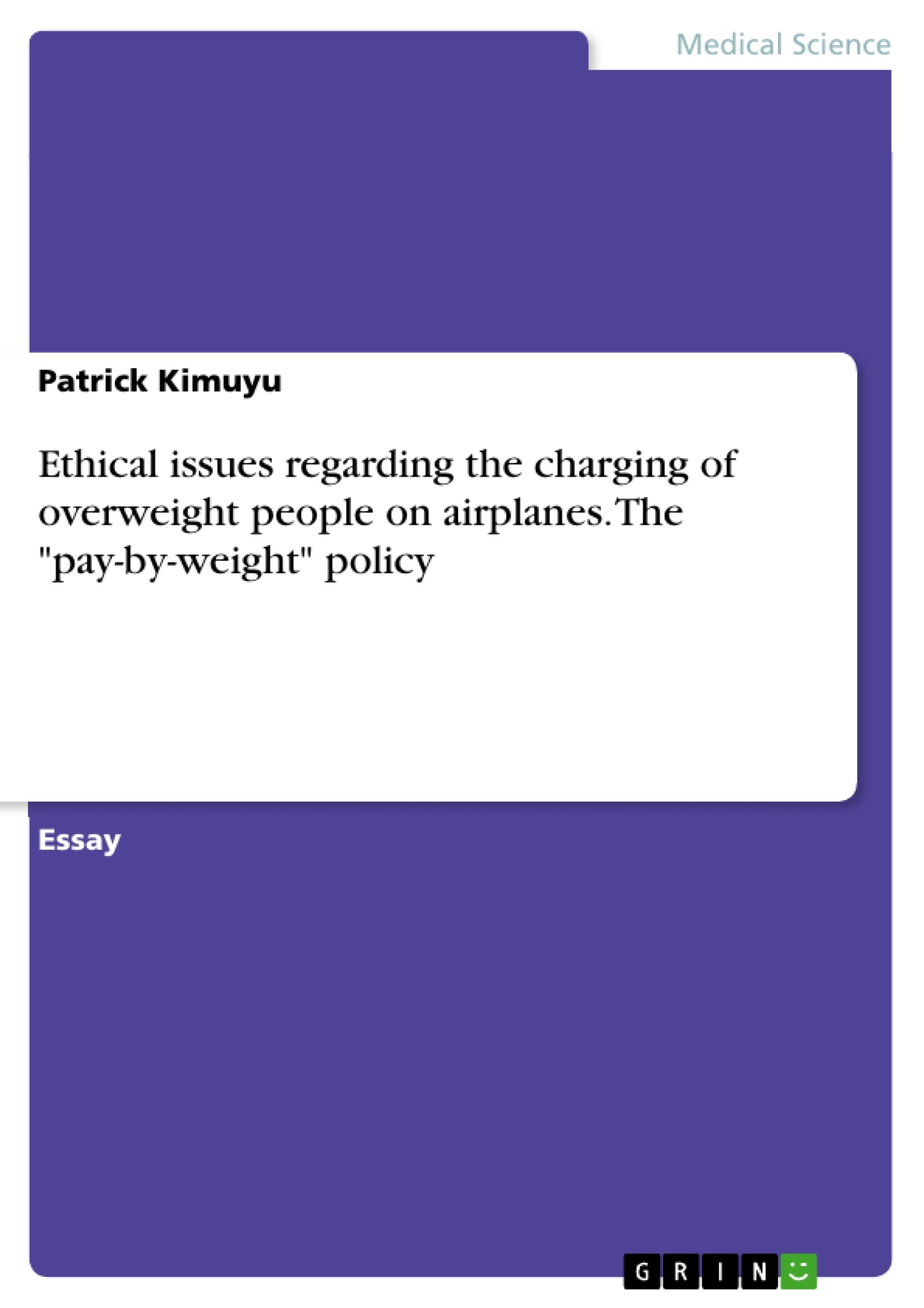Debates over ethical issues do not seem to end anytime soon. Over the past half century, ethical issues have been emerging in the global society, especially the industrialized world. For instance, the debate over the decriminalization of abortion and euthanasia has lingered around for quite too long without a consensus decision. On the other hand, the issue of gay marriages that emerge in 1970s remained surrounded by immense controversy until a few months ago when the US Supreme Court brought the issue to rest through upholding gay rights.
Surprisingly, the termination of gay marriages debate did not seem to change the course of ethical phenomena among the global society. Recently, a new ethical issue emerged: the pay-as-you-weigh policy. This policy requires obese people to pay extra charge in the airlines. In retrospect, obesity is considered as an ethical issue and it has emerged to be a controversial subject. It is an ethical issue because it causes adverse consequences to obese individuals, as well as, the society.
However, these factors do not seem to be part of the justification for the introduction of pay-as-you-weigh pricing in the aviation industry. Instead, the core argument by airline administrators and economists is that flying obese people increases fuel costs; thus, the so-called "fat-taxes" will address the issue of financial costs. Contrary to this perspective held within the aviation industry, environmentalists view obesity as an issue that has environmental cost.
The increased fuel consumption by airplanes is believed to exacerbate climate change, primarily global warming due to increased greenhouse gas emissions. From these perspectives, it is apparent that obesity is a controversial issue. Therefore, this research will provide a comprehensive overview of the ethical issue of charging overweight people on airlines.
Inhaltsverzeichnis (Table of Contents)
- Introduction
- Overview of the 'Pay-by-Weight' on Airlines
- The Problem of Increasing Fuel Costs
- Tony Webber's Proposal
- Peter Singer's Perspective
- Bharat Bhatta's Approach
- Case Scenario
- Samoa Air's Implementation
- Other Airlines' Approaches
- Objections to the 'Pay-by-Weight' System
- Policies Related to 'Pay-by-Weight' Policy
- Lack of Clear Public Policies in the United States
- Canadian Judicial System and Discrimination Based on Body Weight
Zielsetzung und Themenschwerpunkte (Objectives and Key Themes)
This research aims to provide a comprehensive analysis of the ethical issue of charging overweight passengers on airlines, focusing on the 'pay-by-weight' pricing policy. The study examines the arguments and perspectives of various stakeholders, including economists, ethicists, airline administrators, and environmentalists.
- The growing problem of obesity and its impact on aviation fuel costs.
- The ethical implications of implementing a 'pay-by-weight' system on airlines, including potential discrimination and fairness concerns.
- The role of public policy in addressing the issue of obesity and the implications for airline pricing policies.
- The practical feasibility of implementing a 'pay-by-weight' system across different airlines and the challenges involved.
- The legal and regulatory frameworks governing airline pricing and the protection of passenger rights, particularly concerning those with disabilities.
Zusammenfassung der Kapitel (Chapter Summaries)
The first chapter introduces the ethical debate surrounding obesity and the emergence of the 'pay-by-weight' policy on airlines. It outlines the main arguments for and against this policy, focusing on the perspectives of economists, ethicists, and environmentalists.
The second chapter explores the historical development of the 'pay-by-weight' proposal, highlighting the key contributions of Tony Webber, Peter Singer, and Bharat Bhatta. It examines the rationale behind the proposal, including the increasing fuel costs associated with overweight passengers and the need for a more equitable pricing system.
The third chapter analyzes the case scenario of Samoa Air, the first airline to adopt the 'pay-by-weight' system. It assesses the feasibility of this policy for smaller airlines and explores the potential challenges and considerations for larger carriers.
The final chapter examines the current legal and policy landscape surrounding obese passengers and airline pricing. It discusses the lack of clear public policies in the United States and compares the approach of the Canadian judicial system in safeguarding the rights of individuals with disabilities, including those with obesity.
Schlüsselwörter (Keywords)
The primary keywords and focus topics of this research include obesity, aviation fuel costs, 'pay-by-weight' pricing policy, ethical implications, discrimination, fairness, public policy, legal frameworks, passenger rights, and airline pricing models.
Frequently Asked Questions
What is the "pay-by-weight" policy in airlines?
It is a pricing model where passengers are charged based on their total body weight and luggage, rather than a flat seat rate, often justified by fuel cost considerations.
Why do airlines argue for charging obese people more?
The core argument is economic: heavier loads increase fuel consumption and greenhouse gas emissions, leading to higher operational costs for the airline.
Which airline was the first to implement a pay-by-weight system?
Samoa Air was the first airline to adopt this pricing model, highlighting its feasibility for smaller carriers in specific regions.
Is charging by weight considered discriminatory?
The research explores this ethical conflict, noting that while some see it as fair "user-pays" pricing, others argue it discriminates against people with disabilities or metabolic conditions.
How does Canada differ from the US regarding obese passengers' rights?
The Canadian judicial system has established protections against discrimination based on body weight, whereas the United States lacks clear, unified public policies on this issue.
- Quote paper
- Patrick Kimuyu (Author), 2018, Ethical issues regarding the charging of overweight people on airplanes. The "pay-by-weight" policy, Munich, GRIN Verlag, https://www.grin.com/document/387501



